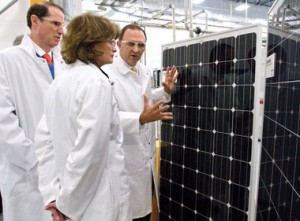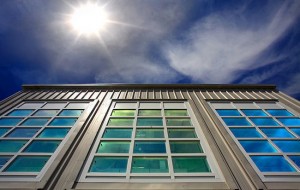 The U.S. Department of Commerce has just issued a preliminary finding that Chinese state sponsorship of its solar industry is anti-competitive under U.S. and international trade law and ordered preliminary duties on the industry’s U.S. exports of crystalline silicon solar cells and panels to offset the effects of China’s illegal subsidies. Commerce will require importers of record to post deposits or bonds toward anti-subsidy margins of 2.9 percent for cells and panels made by Suntech, 4.73 percent Trina Solar and 3.59 percent for all other Chinese manufacturers.“We commend the Department of Commerce for its preliminary decision today, which is the first step in a process that will roll out over the next several months,” said Gordon Brinser, president of SolarWorld Industries America Inc., member of the seven-manufacturer Coalition for American Solar Manufacturing (CASM) and petitioner in anti-subsidy and anti-dumping cases against the Chinese industry. “We need both the domestic manufacturing and installation businesses to participate in fair competition to advance our solar industry’s reach for greater national energy, economic and environmental security.”
The U.S. Department of Commerce has just issued a preliminary finding that Chinese state sponsorship of its solar industry is anti-competitive under U.S. and international trade law and ordered preliminary duties on the industry’s U.S. exports of crystalline silicon solar cells and panels to offset the effects of China’s illegal subsidies. Commerce will require importers of record to post deposits or bonds toward anti-subsidy margins of 2.9 percent for cells and panels made by Suntech, 4.73 percent Trina Solar and 3.59 percent for all other Chinese manufacturers.“We commend the Department of Commerce for its preliminary decision today, which is the first step in a process that will roll out over the next several months,” said Gordon Brinser, president of SolarWorld Industries America Inc., member of the seven-manufacturer Coalition for American Solar Manufacturing (CASM) and petitioner in anti-subsidy and anti-dumping cases against the Chinese industry. “We need both the domestic manufacturing and installation businesses to participate in fair competition to advance our solar industry’s reach for greater national energy, economic and environmental security.”
“If fair international trade can be re-established, the solar-pioneering U.S. industry will once again compete on legitimate market factors such as product performance, production efficiency and unsubsidized pricing,” Brinser said. “We need both the domestic manufacturing and installation businesses to participate in fair competition to advance our solar industry’s reach for greater national energy, economic and environmental security.”CASM contends that China’s broad portfolio of subsidies spurred its producers to build huge excesses of manufacturing capacity, export more than 95 percent of production and sell product at artificially low prices to unfairly seize U.S. market share at the expense of domestic producers. At least 12 U.S. manufacturers of crystalline silicon solar cells and panels have closed plants, gone bankrupt or staged significant layoffs since 2010.
On Dec. 2, the U.S. International Trade Commission (ITC) made a unanimous preliminary determination that China’s trade practices were harming the domestic industry. On Jan. 30, Commerce found that Chinese importers had mounted a massive, evasive surge ahead of the preliminary determination. As a result, today’s ruling on duties applies to Chinese solar imports not just hereafter but also retroactively 90 days. Commerce is expected to issue a preliminary ruling on anti-dumping duties on May 16 (announced May 17). Final determinations on the duties would take place in the summer. To close the case in the fall, the ITC would need to make a second, final ruling on whether Chinese trade practices have harmed the domestic industry.












